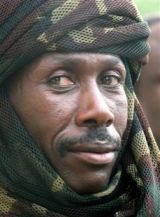New peace proposal meets demands – Darfur rebels
May 4, 2006 (ABUJA) — A proposal drafted by the United States and Britain to help end the war in Sudan’s Darfur region meets key rebel demands and could set the stage for a peace accord, a rebel negotiator said Thursday.
 A rebel negotiator, speaking on condition of anonymity because the parties involved had been asked not to reveal details of the proposal, said it called for thousands of rebels to be integrated into Sudanese security forces.
A rebel negotiator, speaking on condition of anonymity because the parties involved had been asked not to reveal details of the proposal, said it called for thousands of rebels to be integrated into Sudanese security forces.
Sudanese government officials were not immediately available for comment but have indicated they were ready to make concessions.
Jaffer Monro, spokesman for the largest rebel group, the Sudan Liberatian Movement, told The Associated Press that the U.S.-drafted revisions to an earlier draft made an agreement possible.
“We are going to study them, but the improvements give us the sign that we can agree, that we do not need to renegotiate and that there will be no further delay for the final agreement,” he said.
The rebel statements came as top U.S. and British envoys faced a Thursday midnight deadline to persuade Darfur’s warring parties to sign a peace pact and resolve the crisis that has claimed at least 180,000 lives and forced more than 2 million people to flee their homes in the vast western Sudanese region.
The negotiator said the draft called for a minimum of 4,000 rebels to be integrated into Sudan’s armed forces and another 1,000 in the police force. In addition, 3,000 rebels would be given training and education to prepare them for civilian life.
The concessions from the Sudanese government make agreement possible, though the rebels remained concerned about security arrangements, according to the negotiator.
The European Union’s executive Commission, which has been closely following the talks in the Nigerian capital, also said Thursday a deal was imminent and announced it would contribute $125 million for a humanitarian and initial recovery package.
Sudan appeared ready Wednesday to agree to faster disarmament of Arab militias in Darfur and to accept more rebels into its security forces, government spokesman Abdulrahman Zuma said.
Rebels had over the weekend rejected an initial peace proposal drafted by African Union mediators who have been working with the sides for two years.
That proposal, which was accepted by Khartoum called for a protection force for civilians in the immediate aftermath of the three-year-old war, but did not spell out its composition. The rebels want a joint protection force comprising rebels and government, African Union and U.N. forces.
U.S. Deputy Secretary of State Robert B. Zoellick, British Cabinet member Hilary Benn and other international envoys stepped in to try to work out a compromise.
Since the Westerners’ arrival, the Sudanese government has shown increasing flexibility.
“Through this so-called American initiative, it seems that the government is going to make some concessions, especially about reintegration and disarmament,” Zuma told AP on Wednesday.
The initial draft called for disarmament of the Arab militias known as Janjaweed, but did not specify how quickly that would accomplished or how many rebels would be absorbed into national security forces.
Two Sudanese rebels close to the negotiations, also declining to be identified until the new proposal is made official, said the revised draft addressed their demands for greater power and wealth sharing.
Zuma said the power and wealth sharing issues had been settled and were not open to discussion.
Earlier, Monro had said the rebels would press for the United Nations or another body to take over the peace talks if the initial proposal was not significantly changed.
African Union mediators have often expressed frustration at the seeming unwillingness of either side to compromise or adhere to a cease-fire declared in April 2004.
African Union spokesman Nouredine Mezni said African mediators had made “titanic efforts” to produce the draft proposal and any changes would have to be negotiated by other parties.
The U.S. and British officials appeared to step into that breach. They were sent to Abuja, the Nigerian capital where the talks are taking place, after thousands of Americans including several legislators protested over the weekend to demand an end to the slaughter in Darfur.
Decades of low-level tribal clashes over land and water in Darfur erupted into large-scale violence in early 2003 with rebels demanding regional autonomy. The central government is accused of responding by unleashing Janjaweed militias upon civilians, a charge Sudan denies.
(ST/AP)
